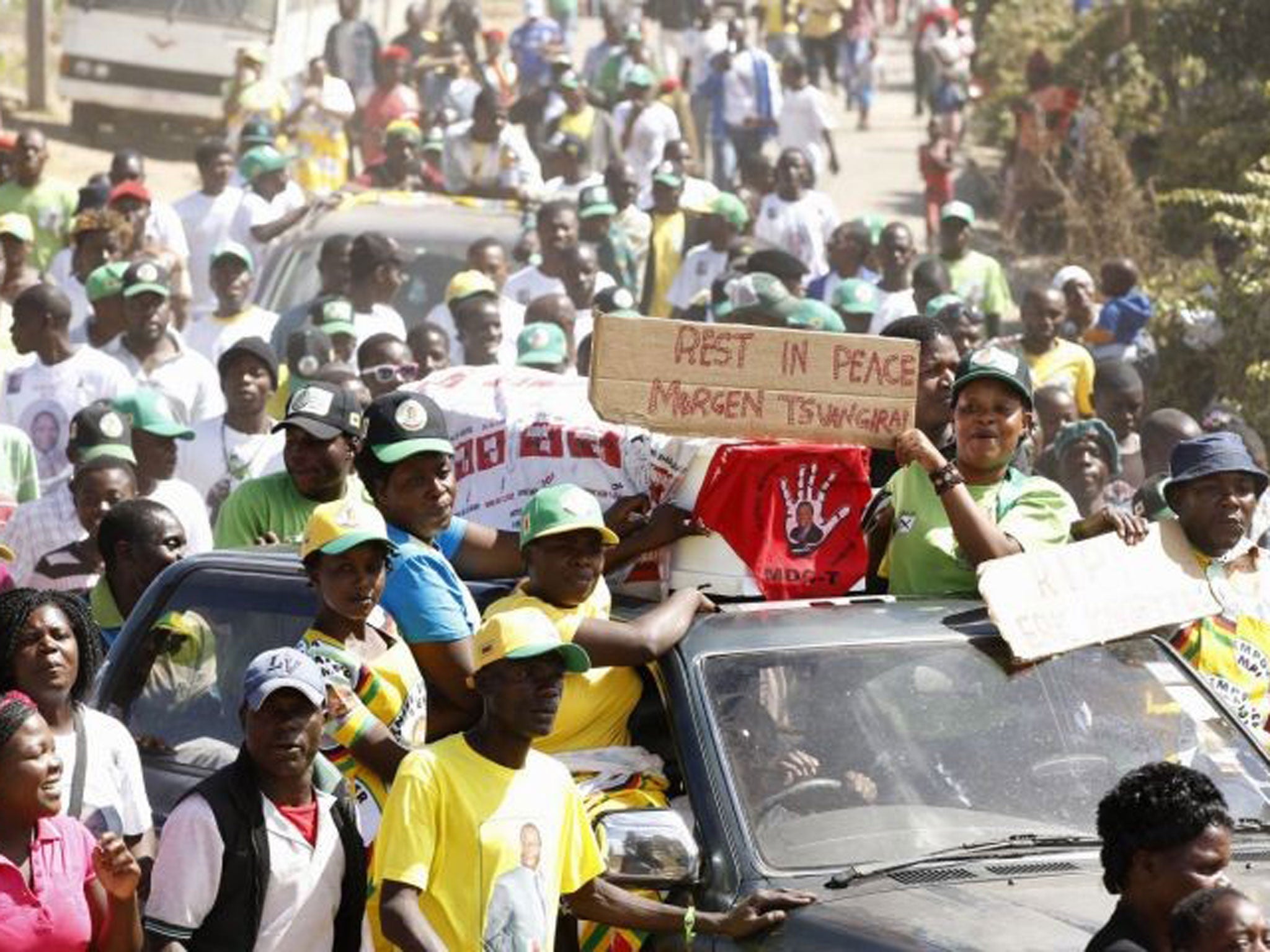Zimbabwe election: Morgan Tsvangirai supporters claim attacks in wake of Robert Mugabe win
Country edges closer to disorder after 'monumental fraud' of general elections

Your support helps us to tell the story
From reproductive rights to climate change to Big Tech, The Independent is on the ground when the story is developing. Whether it's investigating the financials of Elon Musk's pro-Trump PAC or producing our latest documentary, 'The A Word', which shines a light on the American women fighting for reproductive rights, we know how important it is to parse out the facts from the messaging.
At such a critical moment in US history, we need reporters on the ground. Your donation allows us to keep sending journalists to speak to both sides of the story.
The Independent is trusted by Americans across the entire political spectrum. And unlike many other quality news outlets, we choose not to lock Americans out of our reporting and analysis with paywalls. We believe quality journalism should be available to everyone, paid for by those who can afford it.
Your support makes all the difference.Church leaders in Zimbabwe have called for peace following the country’s disputed general election results, as members of Morgan Tsvangirai’s opposition MDC party claimed they had been attacked and forced from their homes by supporters of President Robert Mugabe.
More than 30 people from two different provinces arrived at the MDC party headquarters on Sunday, seeking refuge after they were allegedly targeted in politically-motivated violence, the BBC reported.
A spokesperson for the party, Douglas Mwonzora, said the attacks had been “well planned”, with Mr Mugabe’s followers going from door to door seeking out opposition supporters and forcing them to pack their bags and leave.
Though a spokesman for the leading ZANU-PF party told the BBC they denied the claims, there have been increasing concerns that disagreements will boil over into disorder.
ZANU-PF took a two-thirds majority in Zimbabwe’s 210-seat parliament, and Mr Mugabe won 62 per cent of the presidential vote, in elections on Wednesday that Morgan Tsvangirai has called “a monumental fraud”.
And the opposition party, the only group to come close to opposing the 33-year rule of the 89-year-old Mr Mugabe, has previously said it received “radical” calls to take action from its supporters, reflecting “the frustration, hopelessness and anger in every one of us”.
With both sides edging closer to violence, Zimbabwean police have set up extra roadblocks and water canon stations in the capital of Harare, and took the unusual measure of arming officers with automatic rifles.
In a nationwide message to worshippers on Sunday, the Roman Catholic church called on Christians not to be “consumed by bitterness that leads to violence”.
Church leader Father Charles Kanongwa said: “Peace in your heart brings calm. Trust and have faith.”
South African President Jacob Zuma, the chief regional mediator in Zimbabwe's decade-long political and economic crisis, has congratulated Mugabe on election victory and called for all parties to “accept the outcome”.
Observers are seeking to avoid the onslaught of violence that following the 2008 elections, in which the opposition captured 111 seats to Mr Mugabe's 99, and Mr Tsvangirai won the first round of the presidential vote, but was forced to boycott proceedings in protest against attacks on his supporters.
In the past week monitoring groups have called for an investigation, amid claims as many as 700,000 eligible voters were left off the election register. The UK Foreign Office commended the people of Zimbabwe on the peaceful process, but Foreign Secretary William Hague voiced “grave concerns” over how it was conducted.
While the dispute raged on, state radio reports quoted security minister Sydney Sekeramayi saying voters had given ZANU-PF the mandate to continue with its programme of black empowerment, taking over control of at least 1,100 businesses and companies that remain in the hands of foreign owners and the nation's small white community.
Even before he had been re-sworn into office and appointed a new cabinet, the message was clear that it was back to business as usual under Mr Mugabe’s rule, and the dust is expected to have long settled by the time independent bodies release their final reports into the scale of electoral inconsistencies.
Join our commenting forum
Join thought-provoking conversations, follow other Independent readers and see their replies
Comments